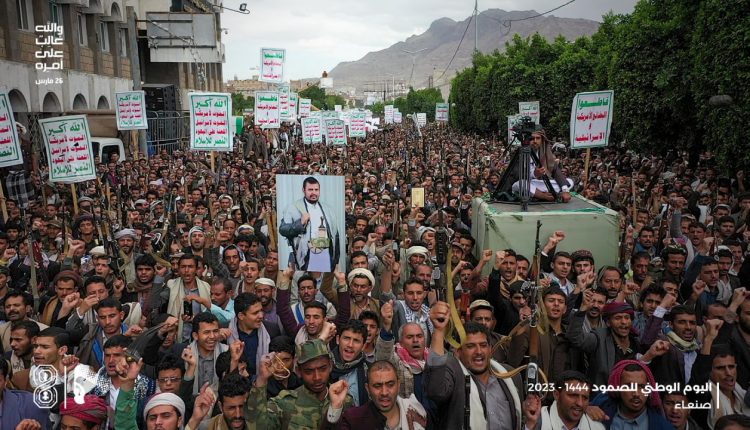The commemoration of the National Resilience Day this year represented an entryway to a new phase of confrontation. The anniversary coincided with a series of messages and affirmations directed by Sanaa and the National Leadership, revealing details of the enemy's negotiating position, renewing reminders of its obligations, warning of the consequences of reneging on those commitments, and confirming readiness to take a range of strategic and qualitative options.
The speech of the Revolution Leader, Sayyid Abdul-Malik Badr al-Din al-Houthi, on the occasion of the anniversary this year, carried the most prominent of those messages and affirmations. It created a clear impression that they are paving the way for a new phase, not just general warnings, as they come at an important time that coincides with a full year since the start of the ceasefire and de-escalation phases, which were tested enough to reveal the reality of the enemy's intentions and desires for peace.
The Member of the National Delegation, Abdul-Malik al-Ajri, reinforced the impression created by the Revolution Leader's speech. He affirmed in an interview with "Al-Masirah" that Sanaa had been trying to give the other party the largest possible allowance to return, provided there was practical movement and not just tactics and manipulation. He added that Sanaa does not bet on Saudi Arabia's ability to free itself from American pressures, but invites it to seize the opportunity before it ends.
This indicates that Sanaa has reached a semi-final evaluation that Saudi Arabia does not have a clear desire to move towards peace, and that the national interest in allowing room for solution efforts is part of establishing the justification.
This accurate clarification of the enemy's goals, by a member of the national negotiating delegation, clearly indicates that the situation has passed the stage of giving the other party the advantage of doubting their motives, because they have clearly demonstrated them in a way that no longer leaves doubt. Therefore, what remains of the opportunity granted to them is only related to putting themselves in front of final decisive choices, and bearing the responsibility of their consequences in front of the whole world.
In this context, Al-Ajri points to the enemy's bad intentions in what they have recently done regarding Yemeni aviation, hindering flights and ship movements, and attempts to pressure, which he confirms "show a clear and serious escalation."
He adds that Sanaa "will not remain in a state of constant review and monitoring and will not allow a new state of manipulation. In the event that the war returns, the rules will change, and if Saudi Arabia seeks to withdraw itself from the war, the return of the war will make it a strategic target for operations." He also adds that "the leader of the revolution affirmed that the path to peace is strategic, objective, and fixed, including reconstruction and addressing the damage that the enemy cannot leave without."
As the conflict in Yemen continues to escalate, Al-Ajri has spoken out, demanding that Saudi Arabia pay for the damage caused by the war and the subsequent need to rebuild the country. In a recent statement. He warned that the coming year would see the deployment of long-range missiles that are both deadly and highly accurate.
Moreover, he made it clear that any decision to reject their demands will have serious consequences. Sanaa always stresses the importance of understanding the full implications of any decision made by the enemy, so they blame only themselves.
To this end, the member of the delegation explained the nature of the military operations that would be carried out if the conflict were to resume. These would be based on a simple equation: oil for oil and airports for airports. The goal would be to target sensitive economic and strategic assets of the enemy, a fact that was explicitly stated by the Revolution leader in his recent speech.
It is clear that the coming phase of the war will be the biggest and fiercest, one that is aimed at striking at the very heart of the enemy's economy. As the Al-Ajri warns, the consequences for the region could be significant. However, one thing is certain: Yemenis are determined to continue their fight, and they will not rest until their demands are met.
The recent commemoration of National Resilience Day in Yemen has taken on added significance, with warnings from the leader of the Revolution that future military operations will be more punitive than cautionary. The remarks, delivered in a speech that also hinted at a shift from defense to offense, have raised concerns about the potential destruction of vital infrastructure and escalated tensions across the region.
The Sayyid Al-Houthi warnings have been interpreted as a final opportunity for the enemies to reassess their objectives before the conflict reaches a new level of intensity. While previous military operations have already had a significant impact and forced the enemy to seek peace talks, the Sayyid Al-Houthi latest speech suggests that any further escalation will make it much harder to reach a resolution through negotiation.
These warnings have been accompanied by a number of messages and public declarations, including the Great Popular Mandate, that clearly indicate that the period of calm that has lasted for the past year was not a sign of weakness but a strategic pause to prepare for a new phase of the conflict. This phase, which will be significantly different from the first, has left the US-backed Saudi-led aggressive coalition between two possible paths to take, either genuine and comprehensive peace, or decisive war.







